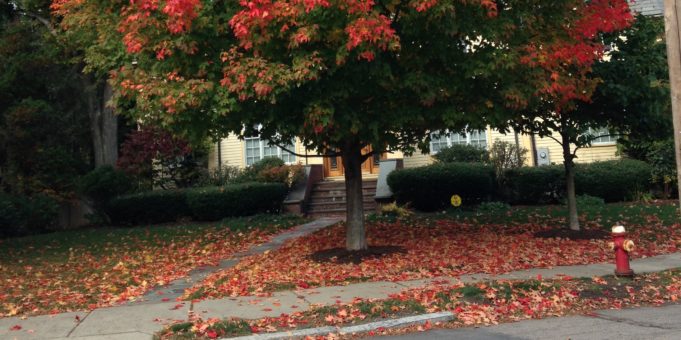This post was originally published in the Newton Tab on June 6. We are reprinting it with the permission of the author, GN member Andrew Martin.
Newton’s City Council will soon be voting on a proposed revision of the Noise Ordinance that would limit the use of leaf blowers. This is a golden opportunity for the Council to move Newton toward a 21st century Garden City that’s not merely quieter but more beautiful, sustainable, and healthy. The revision is opposed by defenders of an obsolete business model built around an obsolete technology, perpetuating a biologically perverse and esthetically cramped landscaping approach.
Envision a Garden City in which leaf blowers would be a small part of an entirely different landscaping approach. Yards would be full of a rich variety of shrubs, flowers, vegetables, and trees. Their design and care would reflect the creativity and ingenuity of homeowners and landscapers who have biologically informed training. Vegetation would be fed by organic nutrients produced by the gardens themselves. Instead of being noisily and wastefully carted away, leaves would be shredded and composted, and grass cuttings would be turned into nutrients by soil organisms. The vegetation would be protected from insect damage and disease by integrated pest management (IPM), dispensing with the chemical pesticides that are especially toxic to children and pets but that also destroy the multitude of organisms on which a healthy soil depends. The fewer, smaller lawns remaining would be kept drought and disease resistant by that healthy soil, along with mowing high and only when needed rather than regularly, and watering deeply at long intervals instead of daily. Besides enjoying the fruits of this approach, residents would save the money not spent on fertilizer, pesticides, disposal of valuable organic matter, and other counter-productive practices.
There is clearly not much, if any, need for leaf blowers in this 21st century approach. But there can be plenty of profitable work for landscapers able and willing to learn how to implement this approach and adapt their business models to it. The transition toward such business models would take a little time – to recoup sunk costs, invest in more compatible equipment, and get the needed education. Competition from landscapers implementing the new approach would motivate others to do so. Regulation limiting the use of incompatible equipment, notably leaf blowers, would be an essential additional inducement.
Regulation requiring changes in business models is typically resisted as infeasible and costly, and is as typically shown to be neither. Technology-forcing regulation has elicited streams of creative innovation producing major environmental gains and savings in costs to health, as well as a fairer distribution of costs between those inflicting and suffering environmental costs. That scenario has been repeatedly demonstrated, most strikingly in the auto industry. The very modest technological requirements in the proposed noise ordinance revision, along with its seasonal limitations, can similarly foster the transition to a business model more compatible with a 21st Century Garden City.
That kind of Newton would more than ever deserve the Garden City name in terms of the abundance and variety of flourishing plant life. It would also be one in which the enjoyment of that outdoor environment would be much less disturbed not only by noise, but also exhaust gases and airborne dust and particles that threaten health. And it would be one that would protect the indoor environment of those who work at home, are retired, or suffer from health problems that make loud noise and air pollution painful. In short, it would be a Garden City in which the quality of life would be greatly enhanced.
The proposed revision of the Noise Ordinance would be a step toward that kind of Newton. Will the Council take it and promote a forward looking business model consistent with an ambitious vision of a 21st century Garden City? Or will it perpetuate a regressive business model obstructing a Newton that enhances its residents’ quality of life – or worse, condone a business model predicated on the violation of existing noise limits? This is the challenge the Council confronts as it deliberates on the proposed revision.



Recently on Twitter